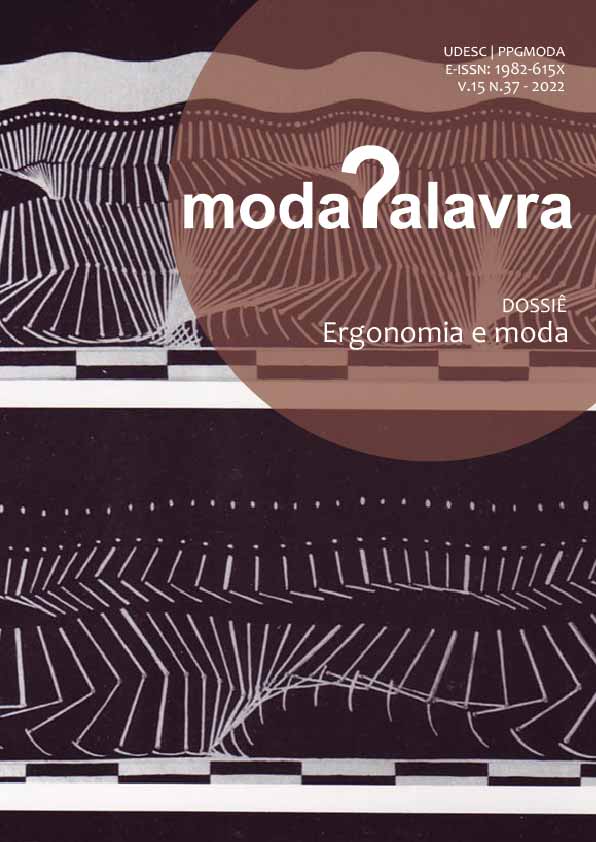Wearability issues of clothing products from the perspective of users
DOI:
https://doi.org/10.5965/1982615x15372022175Keywords:
Dressability, User, Clothing, User-centric designAbstract
With the growth of the fashion market, production cycles become shorter and problems related to the wearability of clothing products become more common. For better assistance, it is understood to be essential to centralize these in the Clothing Product Development Process. In this sense, a way to bring them closer and understand their demands is through the identification of their problems. In order to identify the main problems encountered by users, related to the wearability of clothing products, this research, of a basic nature, qualitative approach and exploratory objective, uses classifieds with twenty respondents between 20 and 50 years old. Through this, problems related mainly to the regions of the ankles, wrists, chest and abdomen (female interviewees) were listed, as well as the abdomen, shoulders and calves (male interviewees). sense of better adapting the product - clothing to the characteristics of the users, minimizing the problems of wearability.
Downloads
References
ALDRICH, Winifred. Modelagem plana para moda feminina. Porto Alegre: Bookman, 2014.
BARDIN, Laurence. Análise de conteúdo. Lisboa: Edições 70, 1977. BEST, Kathryn. Fundamentos de gestão do design. Porto Alegre: Bookman, 2017. 208p. Tradução de André de Godoy Vieira.
GIL, Antonio Carlos. Como elaborar projetos de pesquisa. São Paulo: Atlas, 1991.
GUERRA, Cris. Moda intuitiva. São Paulo: Lafonte, 2013.
MAKARA, E. Gestão de Design em Micro e Pequenas Empresas de confecção do município de Gaspar/SC: o processo dedesenvolvimento de produto de vestuário e a consideração do usuário. [Dissertação de Mestrado]. Florianópolis: Universidade Federal de Santa Catarina; 2017.
MIRANDA, Ana Paula de. Consumo de moda: relação pessoa-objeto. São Paulo: Estação das Letras e Cores, 2008. NORMAN, Donald A..O Design do dia a dia. Rio de Janeiro: Anfiteatro, 2018. 328 p. Tradução de Ana Deiró.
PACHECO, Bruna et al. Moda inclusiva: percepção de mulheres obesas em relação ao corpo e ao vestuário. Revista Ártemis, [S.L.], v. 27, n. 1, p. 443-456, 11 jul. 2019. Portal de Periodicos UFPB. http://dx.doi.org/10.22478/ufpb.1807-8214.2019v27n1.41373.
RASBAND, Judith A.; LIECHTY, Elizabeth L. G. Fabulous Fit: Speed Fitting and Alteration. Second Edition. New York: Fairchild Publications, Inc., 2006.
ROSA, Lucas da. VESTUÁRIO INDUSTRIALIZADO: uso da ergonomia nas fases de gerência de produto, criação, modelagem e prototipagem. 2011. 175 f. Tese (Doutorado) - Curso de Design, Artes e Design, Puc-Rio, Rio de Janeiro, 2011. Disponível em: https://www.maxwell.vrac.puc-rio.br/colecao.php?strSecao=resultado&nrSeq=18873@1. Acesso em: 15 maio 2021.
SENAC (org.). Modelagem Plana Masculina. São Paulo: Editora Senac São Paulo, 2019.
Downloads
Published
How to Cite
Issue
Section
License
Copyright (c) 2022 Daniele Deise Antunes Silveira Páris, Sra, Sra

This work is licensed under a Creative Commons Attribution-NonCommercial 4.0 International License.
When submitting an article for publication in ModaPalavra e-periodico, the author (s) agree (s) with the following terms:
- Authors maintain the copyright in their manuscripts and grant the journal the right of first publication, with work simultaneously licensed under the Creative Commons Attribution-NonCommercial 4.0 International, which allows sharing the work with the acknowledgment of authorship and the initial publication in the journal without payment ;
- Authors may use the same results in other publications after the first publication, provided that they indicate ModaPalavra e-journal as the original publication medium;
- Authors are authorized to take additional contracts, separately, only after the original publication in ModaPalavra e-journal, provided they indicate ModaPalavra e-journal as the original publication medium;
- Authors are allowed and encouraged to publish and distribute their work online (eg in institutional repositories or on their personal page), only after the editorial process and the first publication, provided they indicate ModaPalavra e-journal as the original publication medium;
- To indicate ModaPalavra e-journal as the original publication medium, authors should use the following text template: "This article was originally published by ModaPalavra e-periodical, under a CC BY NC license, in its volume [insert volume] number [insert number] in the year of [insert year], and can be accessed at: http://www.revistas.udesc.br/index.php/modapalavra/ ";
- The opinions expressed in the articles are the author’s sole responsibility, not necessarily reflecting the journal’s opinion. The publication of any material that is owned and held in copyright by a third party, including – but not limited to - articles, photos or drawings was previously authorized by their representatives to be published in ModaPalavra e-journal.









